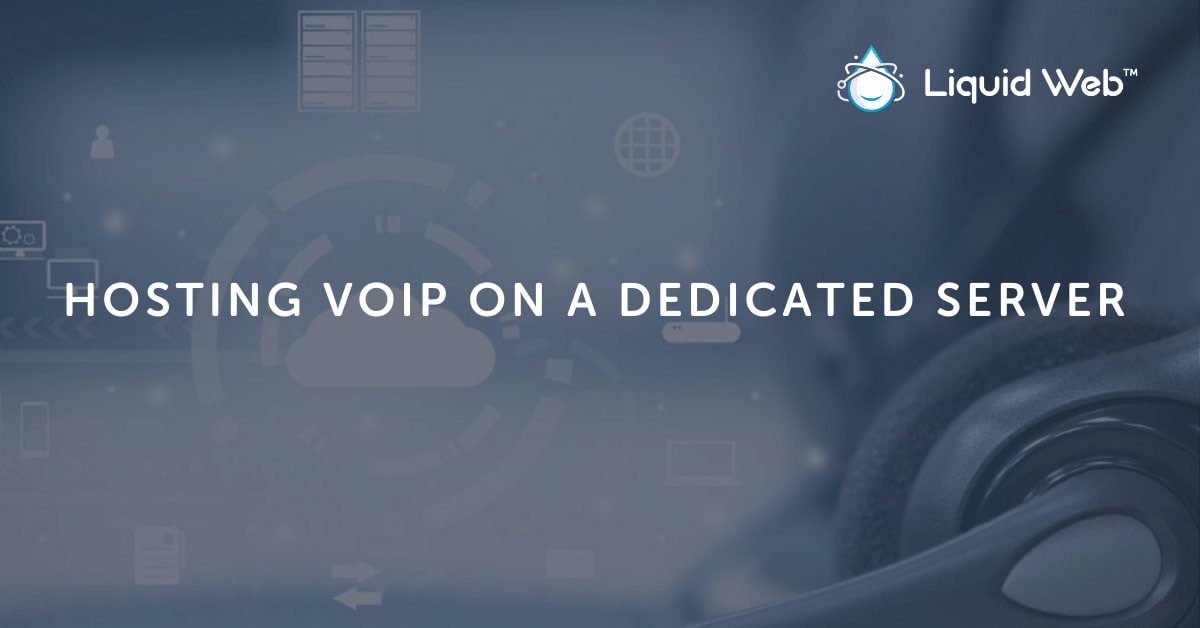
Hosting your business’s website on a dedicated server comes with numerous benefits. If your site deals with network-intensive traffic demands, a dedicated server can help provide a seamless user experience (UX) for your end users even during traffic spikes. Opting for a dedicated server also gives you the freedom to control your server’s configurations, which means you can do things like select what software it runs on and establish customized security protocols based on your organization’s needs.
There are many perks to utilizing managed hosting for voice over Internet Protocol (VoIP) technology on a dedicated server. By hosting private VoIP technology on a dedicated server, you can avoid the costs associated with traditional telephone services while integrating new and better ways for your employees and customers to communicate. If you’re unfamiliar with a dedicated server hosting VoIP technology, this guide is here to help.
What is VoIP?
VoIP server hosting lets anyone place or receive a phone call over a broadband Internet connection, rather than using an analog phone line from a public switched telephone network (PSTN).
With VoIP services on a dedicated server, an employee or customer can place or receive a call using multiple Internet-capable devices like phones, computers, tablets, and many more. So long as a broadband Internet connection is available, VoIP allows users to make calls from any location on their device of choice.
How VoIP Works
VoIP server hosting works by converting a person’s voice into a digital signal. That signal is then packetized (broken into small pieces, compressed, and placed into an electronic envelope), converted into code, and sent along a path over the Internet. Before reaching the receiving device, VoIP technology converts that code and re-assembles it into the appropriate signal based on the device being used.
For example, if you are calling a regular phone number using VoIP, the packetized code is converted into a standard telephone signal by a VoIP service provider and routed through existing telephone network landlines before it reaches the end device.
Does VoIP Server Hosting Require Specialty Hardware or Software?
In the past, VoIP services required specialized hardware—such as a designated computer, analog telephone adaptors (ATAs), or specialty VoIP phones—to place or receive calls over the Internet through a VoIP provider. While this hardware can still be used to establish a VoIP connection, many modern software-based VoIP services are available.
Software-based VoIP services give you the ability to use a softphone (a program or application that is installed on any Internet-capable smart device that features a speaker, microphone, or headset) to connect calls over the Internet. Additionally, robust, software-based VoIP service providers eliminate the need for other internal hardware, such as costly private branch exchange (PBX) systems.

Benefits of Hosting a VoIP System on a Dedicated Server
With a dedicated server hosting VoIP technology, you can experience many real-world benefits.
A few of the most common include:
Reduced Overhead Costs
VoIP server hosting can provide significant cost savings over a traditional landline phone system, as traditional systems require multiple lines and fees for users. Using VoIP, you gain access to one line for both your business’s Internet and calls. In addition, long-distance calling fees are lowered or completely eliminated with VoIP, as your calls are sent over the Internet rather than a PSTN.
With a software-based VoIP system, you could reduce or eliminate other costs like:
- PBX systems and any associated add-on features (e.g., video conferencing).
- Copper wiring charges.
- Phone system installation fees.
- Phone system taxes, repairs, and maintenance fees.
A software-based VoIP system can also reduce the costs associated with employing an in-house administrative support staff, as they allow you to create automated attendants that answer and route your calls to the appropriate extension.
Robust Features
Along with the ability to place and receive calls from multiple devices and create automated attendants, a dedicated server hosting VoIP technology can provide your business with many other robust communication features.
For example, if you do business in more than one location, you can use a virtual phone number that gives you a local area code wherever you need it, even if you don’t have a physical office in that area.
You can also use message forwarding to send messages to other voicemail boxes in your VoIP system, as well as send and receive faxes without a fax machine. Other features include:
- Conference call capabilities.
- Video conferencing tools.
- Instant messaging tools.
- Improved audio quality.
- Simplified phone system scalability.
Advanced Integrations
With your dedicated server hosting VoIP technology, you can easily incorporate advanced integrations that provide new ways for your site visitors to communicate with your business.
For instance, you could implement click-to-call links on your website or in emails that allow customers to initiate voice calls with your sales team directly.
VoIP systems are also designed to easily integrate into customer relationship management (CRM) software. This allows you to easily monitor calling data in real-time and establish call recording to help enhance your website’s UX.
Drawbacks of a VoIP System
While a dedicated server hosting VoIP technology comes with many benefits and practical applications, there are a few drawbacks to consider before opting for one, such as:
- Reliability Issues: A VoIP system relies on a fast, stable, and reliable Internet connection to perform properly. Unfortunately, if your network’s bandwidth is low, the quality and clarity of your online calls could suffer. Additionally, if you experience a power failure, you will be unable to place or receive a call online. There are ways to prevent VoIP system downtime during power or Internet outages, but this often requires added solutions to address.
- Latency and Jitter: VoIP signals are broken down into small pieces and re-assembled before reaching the receiving device. During transmission, these signals could be delayed or re-assembled improperly due to a poor Internet connection, a weak router, or inadequate ethernet cables, leading to latency and jitter. Latency is a noticeable delay between one system, or user, to another. Jitter is when voice data packets are sent out of order or dropped entirely, causing clipped or jumbled audio on the receiving end.
- Limited Emergency Call Support: Because VoIP services can be used anywhere an Internet connection is available, it’s difficult for third-parties to pinpoint where a caller is located. This is especially important during emergency situations, as 911 calls could be transferred to an incorrect line or lack critical information such as a caller’s number or location data.
Getting Started With VoIP Services
Switching your business’s traditional landline phone system to a VoIP system on a dedicated server helps you save on overhead costs. It also introduces new and efficient ways for your employees and customers to communicate.
If you’re new to dedicated servers and interested in VoIP technology, Liquid Web is here to help you get started. With our Managed Dedicated Server Hosting plans, you gain access to a fully customizable server that features the highest level of performance and security. This allows you to unlock the benefits of a robust dedicated server vs shared hosting. It also allows you to easily implement your own private VoIP system for your network.
Reach out to one of our Managed Dedicated Hosting Advisors today to learn more.
[ad_2]
Source link








